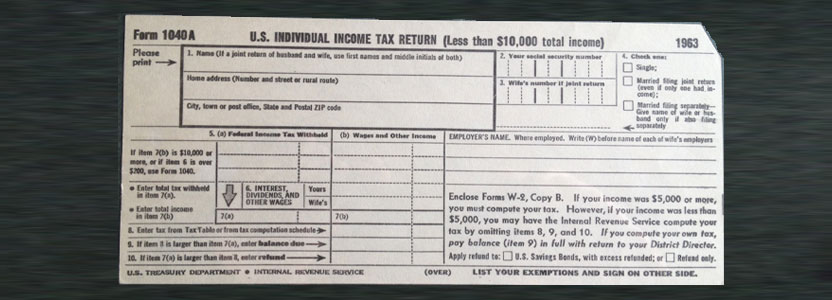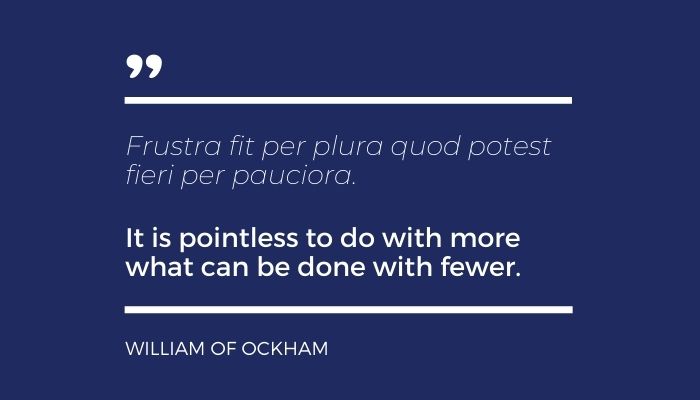Blame my accountant’s wall, but I have some strong opinions about the value of simplicity, the epidemic of complexity, and the opportunity we all have to choose one path or the other. For leaders and managers, this is an especially important topic. Because in the world of business, we don’t always get to select the level of complexity around us. But with awareness and effort, we can choose approaches that allow for more simple management within our sphere of influence.
If that sounds like it could be your cup of tea, let’s start by taking a trip back to 1963. Then, we’ll dive into:
- Why it’s valuable to avoid or combat complexity
- The challenges of your context
- How to simplify
Filing Taxes Circa 1963
I did some major head-shaking when I saw this 1963 federal tax-return form, which my former CPA kept framed on his wall. Here it is, in its entirety:

In ‘63, for individuals making today’s equivalent of about $70,000, this 3” x 7” form would have done it all. Today, the same form has grown to over 7 times this size, filling 2 full 8.5 x 11 pages and arriving alongside by a nifty 111 page instructional PDF (not exaggerating).
Result? Today, Americans spend 8 billion hours preparing tax returns each year, according to some estimates. That’s like 4 million Americans working full-time at nothing but tax preparation. Which is 2.5% of our entire labor force (every single working person + every single unemployed person, whether they want to work or not)!
Of course, my tireless coaching brain looks at this and sees a simple management lesson—a metaphor for how great we are at transforming basic matters into complex problems.
So how can managers keep as close to the 3” x 7” model as possible? How do we fight the tendency to move toward complexity?
By constantly and ruthlessly simplifying. But if that answer’s too simplified, no worries. We’ll talk details.
Why Does Simple Management Matter?
Before we dig into the how here, it’s important to get on board with why we even want to aim for simple management in the first place. What’s the value?
Some smart people at the Stanford Graduate School of Business studied this by examining companies and their product-development processes. Their findings are educational no matter what your sector. In a nutshell, they discovered that “effective people think simply.” And they defined 3 key reasons for this link between simplicity and efficacy. My summary:
- Simplicity speeds decision-making. When you only need to think of a few factors, you can make choices more efficiently.
- Complexity clouds our vision of the future. For example, too much data and complex formulas lead to “over-fitting” the past into the present, which is a poor predictor of the future.
- Simplicity leads to action. If you have 3 rules to remember, you’re more likely to enact them than if I give you 15 rules. (Hint: the more high-stress the environment, the more powerful this factor becomes.)
For your learning time: the team at Stanford created a video describing the study, as well as what they learned. It’s good food for thought, and it has some actionable insights on simple management:
The power of simplicity goes beyond these reasons, of course. Simple management can help
- Clarify intention
- Minimize frustration
- Prevent chaos
- Improve focus
- Support innovation
- Reinforce vision
- Etc.
I could probably go on all day. Add your own reasons, and let’s kick this into action:
Seek Small
At the core, most problems are in fact much simpler than the complicated solutions we end up designing.
When addressing a problem with great potential for complexity, you can start to find your way out by keeping one (appropriately) simple management pattern in mind:
Large begets complexity. Small begets simplicity.
For example:
- Large companies lament that desperately needed changes and innovation get squashed by the bureaucracy again and again. Small companies, on the other hand, turn on a dime, often overcoming resource shortages with agility and decisiveness.
- Large churches constantly encourage attendees to join small groups that typically meet in people’s homes, in part to help keep churchgoers engaged and connected.
- We design massive, expensive government safety-net programs and staff them with office buildings full of administrators who publish large manuals of rules and guidelines. Yet experienced social workers will tell you that the most incredible success stories arise when people have just 1 advocate who genuinely cares about and invests in them as individuals. (Exhibit A: the great accomplishments of Big Brothers Big Sisters.)
You get the point. But here’s the challenge: we can’t all work in a small company, create a small group, or get one-on-one with our audience. Sometimes, the context where we’re dealing with complexity is big—no getting around it.
But that doesn’t mean we’re stuck.
When we can’t make small our reality, we can still learn from and make use of its advantages.
The Less-is-More Approach to Simple Management
One reason small businesses employ simple management more naturally than large organizations is that they have all the good things big companies do, but rarely as many of those things.
Fewer people + fewer products + fewer systems & rules = less complexity.
Use this awareness to your advantage by embracing less whenever possible. Examples:

- Before you send that e-mail, stop and make sure you need to copy all those people. Does everyone need that conversation in their inbox? Fewer people = more simplicity.
- Before launching or expanding a product or offering, assess what you have. Which existing products are most successful? Which have the greatest growth potential? Have you outgrown any of them? Perhaps a new offering is the answer, but it could be that a simpler, more strategic product mix would better support your goals. Fewer products = more simplicity.
- Before suggesting another process, map out the current landscape: Are your existing processes working, or causing confusion and extra work? Cross-departmental interviews can be hugely educational in unearthing insights quickly. (Interviews with individuals or very small groups! Remember, fewer people!) Fewer processes = more simplicity.
Keep in mind, this isn’t easy! But the world’s a bit confused about the correlation between easy and good.
It can be hard work to get back to simple, but it’s valuable, important work.
Wisdom via Simplicity
I’ll leave you with a relevant quote from T.S. Eliot’s Choruses from “The Rock,” wherein he asks this very thought-provoking question:
Where is the wisdom we have lost in knowledge?
Where is the knowledge we have lost in information?
I like to take it further and ask, where is the information lost in facts? And where are the facts lost in data?
This is a rabbit hole many of us have gone down. And too often, we get further from the right answers as we do.
It’s not that data is bad. Nor are facts, information, knowledge, etc. inherently bad. But they must be integrated with a high level of awareness and intention. Because such things do have a tendency toward a 2-part problem:
- They easily amplify complication.
- They often confuse us into believing that the moves we’re making are wise.
But wisdom and logical fact examination are 2 very different things. And the truth is, intuition is considered the highest form of intelligence, as it stems from our collective understanding and experience. In other words, there’s value in a simple gut response.
When things get complicated, be wary of adding to the mayhem by pursuing more information, additional facts, or bigger data. Instead, why not try seeking a bit of stillness and tapping into your inner wisdom? And asking a few of your wisest people to do the same, then share their thoughts with you?
Please use the comments below to share your thoughts and experiences in battling complexity and working toward simplicity-minded management. I look forward to learning from you!




This was such sage advice, advice we probably intuitively know but personally I have struggled with a solution. Isn’t it one of the oldest concepts (KISS) and yet we always seem to make it complex. It’s a conscious effort but simplicity is the best and actually the most honest answer.
Hi Chris. Thanks so much for your insightful reply. It can indeed be a struggle to pursue simplicity, but it is a great path. I I love how you characterize it as “honest.” Great thoughts, and thanks for sharing.